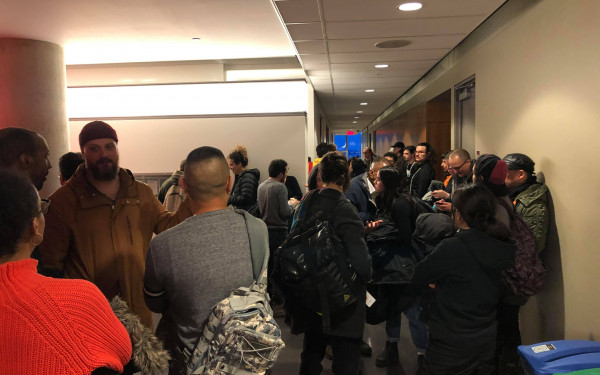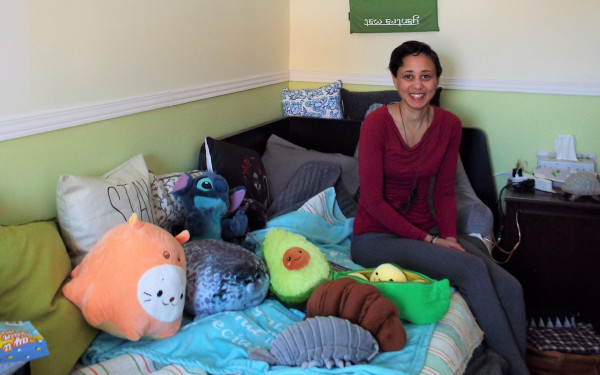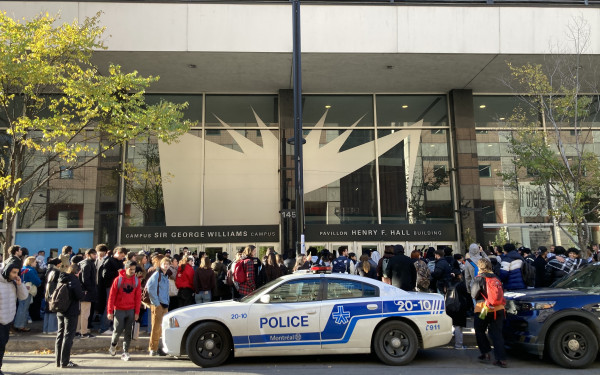Disabled Student Unable to Evacuate During Fire Drill
Concordia Security Mishandled a Student Using Crutches During Learning Square Drill
A disabled student was unable to safely exit the Learning Square building during a fire drill last month and is raising concerns about campus accessibility and evacuation policies.
Jess Marshall, an undergraduate student in the English department, uses crutches on and off to help with hypermobility-related injuries and chronic pain. Marshall was in a science fiction class in the Learning Square building on Sept. 26 when fire alarms went off.
Marshall never made it out of the building. Instead Marshall was instructed to stay in the building by Concordia security because a transfer chair could not be found.
As students and instructors flooded the building’s stairwell and emergency escape, Marshall looked for security guards for guidance as they ushered students out.
“I was worried I was going to get trampled [...] and I was certainly pushed around a lot. I managed to make it back [to the fire escape], and [the security guard was] like, ‘go go go,'” Marshall said.
The student said the fire escape was too precarious to attempt an exit because it had holes in the sheet metal. “Definitely big enough that even if my crutch couldn't fall through—which I honestly think it could have—it could very easily get stuck and wet in there, and I could fall.”
“I don’t think they’re trained for that and I don’t trust them to do it safely.” — Jess Marshall
According to Marshall, the guards radioed downstairs to ask if a transfer chair was available, the usual protocol in evacuations of mobility-impaired people, but there wasn’t one. Marshall said after asking what would happen if this was a real fire, one guard made a remark suggesting they would carry mobility-impaired students down.
“She made a joke about how she would throw me over her shoulders,” said Marshall.
“First of all, I'm injured. I don't want a random person—no offence to the security people— picking me up and dragging me down a flight of stairs in the middle of it. I don't think they're trained for that and I don't trust them to do it safely,” said Marshall.
Marshall explained that luckily, a friend, Ace Côté, was in class that day and able to help figure out what to do. Côté, a second-year creative writing student, explained that they have participated in safety trainings in the past and are rather familiar with drill procedures, but that what happened that day in the Learning Square didn’t inspire confidence at all.
“It was frustrating watching how the situation was handled. It’s a very steep staircase to go out, and there was only one guard—if it had been an emergency, I was not confident they would have been able to get Jess out in any sort of way, much less a way that was not painful or humiliating,” said Côté.
“It felt like they were given very cursory instructions and were not prepared to deal with anyone with mobility issues,” Côté added.
Marshall said navigating campus stairwells using crutches can be trying at the best of times and especially in emergencies. “People have no idea how to have common courtesy with crutches and they overcorrect by just standing at the bottom of the stairs for the full seven minutes to get up,” Marshall said.
Concordia’s website has information related to mobility-impaired students and fire drills. It points to the use of an “Evac-chair” in emergencies and suggests that these chairs are designed to be placed in hallways and near exits ready for an emergency. Marshall said the security guards acknowledged that there should be a chair, but that they did not know where it was or why it wasn’t there that day.
The page also says it's within protocol at the school to leave mobility-impaired individuals on the floor during drills. Contrary to what the guards told Marshall, the website explicitly states that carrying a person out of the building is not recommended.
Marshall and Côté were especially concerned when they noticed the guards radioed downstairs and told the security desk that everyone had been evacuated, which they dispute, as they were both still in the building when this was said.
“If it had been an emergency, I was not confident they would have been able to get Jess out in any sort of way, much less a way that was not painful or humiliating.” — Ace Côté
After the security guard couldn’t find the Evac-Chair, according to Marshall, “she just messaged down being like, ‘we safely evacuated the mobility-reduced person,’ and then she winked at me and was like, ‘yeah, you can stay up here. It's fine,’ and that was that.”
“They fully lied. I wasn’t safely evacuated,” Marshall said. “I don’t know what I would do in an emergency at this point, and I have not been able to get a straight answer from anyone.”
Marshall said regardless of whether the emergency is real, it’s problematic that disabled students will potentially miss out on safety drills that others get to experience in full.
While Marshall and Côté don’t blame the instructor for what happened that day, they say it would have been nice if the instructor had some awareness of what to do in this situation and checked in with the students who remained upstairs.
According to Concordia’s website, there is specific safety training for emergencies that students and staff can take by special request. They are voluntary and subject to cancellation due to low enrollment.
Marshall explained that the Access Centre for Students with Disabilities is too difficult and time-consuming when it comes to providing and maintaining accommodations. Marshall doesn’t think students should have to deal with formal accommodation processes to be able to evacuate safely. Marshall gave student athletes as an example, who could get injured at any time and need accommodations quickly.
Concordia Student Union Executive Coordinator Fawaz Halloum told The Link he will bring up Marshall’s experience with Michael Di Grappa, the university’s vice-president of services and sustainability.
“This doesn’t shock me,” Halloum said. “Accessibility needs to be a bigger priority at Concordia and we need to make sure each and every building has the required support for disabled students.”
Neither Marshall nor Côté felt supported from administration, their instructor or security. Côté didn’t feel that anyone at Concordia took their friend's safety seriously.
“I don't think it was a successful fire drill,” Marshall said. “And I don't think I would be saved there in an emergency.”
This article originally appeared in Volume 43, Issue 4, published October 12, 2022.







